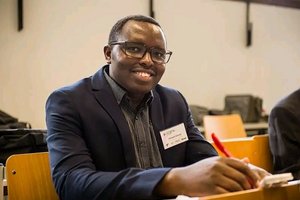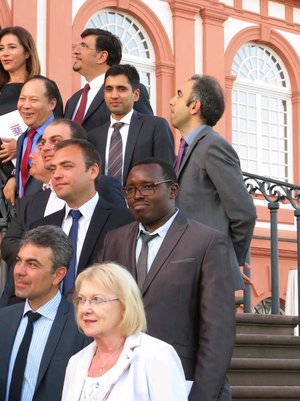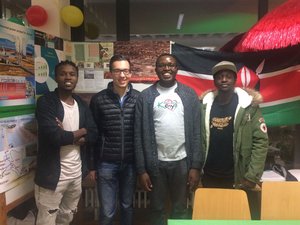Hello Cromwell, you come from Uasin Gishu in Kenya and came to Germany to study at RheinMain University of Applied Sciences. Can you tell us a bit about your journey?
I had already spent a gap year doing voluntary work in the social sector in Frankfurt am Main. Then I completed the Studienkolleg preparatory course at Goethe University, and after that I applied to RheinMain University of Applied Sciences to do a bachelor’s degree.
Why did you choose the Industrial Engineering and International Management degree program?
I actually wanted to study Health Care Economics at RheinMain University of Applied Sciences, but I wasn’t really sure. I went to the student counseling office to get more information. I decided to study Industrial Engineering and International Management straight away during the counseling interview because I have always been interested in business and technology, international business practices and global markets. The variety of career prospects and the opportunity to develop my intercultural skills also appealed to me.
What was life like at RheinMain University of Applied Sciences when you first started studying here?
Things got off to a very good start. I was given a friendly welcome and people always said to me: “It’s great that you’re here!” Hearing that reassured me, so I soon felt at home and was able to complete my degree program very swiftly.
What is the first thing that comes to mind when you recall studying at RheinMain University of Applied Sciences? Were there any special moments during this time?
The most important things were my wonderful study group, the projects, the excursions, the food in the cafeteria, the support I received from the professors, the International Office, the Catholic and Protestant Student Faith Communities, as well as the AStA student union and the Stupa student parliament, where I was very active. I lived in a very nice shared student flat with a family in Rüsselsheim. And of course, being Rüsselsheim, there was also a kebab restaurant.
In 2016, you won the DAAD prize for outstanding achievements of international students! What did that mean for you?
The prize was worth its weight in gold for me and really encouraged and motivated me. It also gave my political, professional, social, and academic activities in Kenya and in Germany a real boost.
Tell us about your career. What led you to your current profession or position?
Today, I work as a team leader in the field of software and web development at the Lenhart Group in Wahlhausen, Mainz and Bingen. While I was studying for my master’s degree, I developed an app and then continued to work in software and development when I began my professional career.
What did you learn at RheinMain University of Applied Sciences that you still use today?
Generally speaking, I acquired a broad range of skills that I need every day as an industrial engineer working at the interface between business and technology. Subjects such as project management and personnel management were important for my current role as a team leader. Through my work as a tutor in the International Office, as an AStA advisor and a member of the Stupa, I was also able to train my negotiation skills and intercultural competence.
What advice would you give to prospective international students who are about to apply to RheinMain University of Applied Sciences?
At RheinMain University of Applied Sciences, every student has excellent opportunities to study and successfully complete their degree program, regardless of their personal background, because you are well looked after here with very close contact to the professors, other students, and university staff. The university provides a good environment for a high quality education. I was able to complete my degree program within the standard period of study.
Is there anything else you would like to say to our international prospective students, applicants or first-year students?
Apply these tips to make fast progress:
- Create study groups and networks.
- Do not put off retaking exams that you have not passed.
- If you are planning a third attempt at an exam, contact the relevant professor at the beginning of the examination semester and arrange a date.
- Don’t wait for others to do things for you, not when it comes to group assignments and projects either, always do your part on time.
- Join social and academic networks.
- Get involved in the AStA, the International Office, the Internal Faculty Student Committee and take advantage of the many extra-curricular activities at the university.
- Start planning your revision time for the exam at the end of the semester as early as possible.
- And the most important thing: don’t give up, even if things get difficult!


